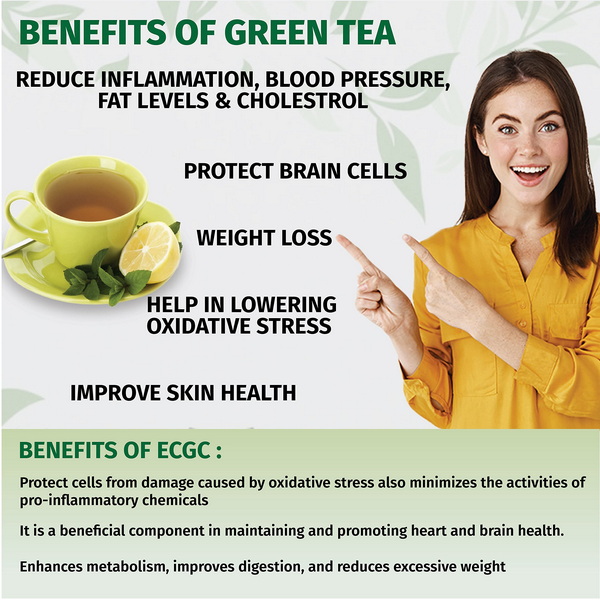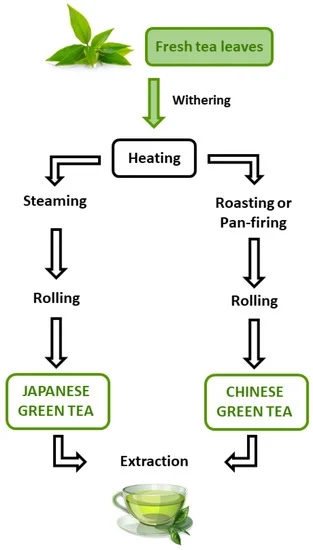Content Menu
● What is Green Tea Extract?
● Understanding Heart Palpitations
● The Connection Between Green Tea Extract and Palpitations
>> Caffeine Content
>> Interaction with Medications
● Research Findings on Green Tea Extract and Heart Health
>> Cardiovascular Benefits
● Recommendations for Safe Consumption
● Potential Side Effects of Green Tea Extract
● Expanding on Health Benefits
>> Weight Management
>> Antioxidant Properties
>> Brain Health Benefits
>> Skin Health
● Conclusion
● FAQ
>> 1. What are heart palpitations?
>> 2. Can everyone take green tea extract safely?
>> 3. How much caffeine is in green tea extract?
>> 4. What should I do if I experience palpitations after taking green tea extract?
>> 5. Are there any benefits to drinking regular green tea compared to extracts?
● Citations:
Green tea extract has gained immense popularity in recent years due to its numerous health benefits, including weight loss, improved heart health, and enhanced mental alertness. However, as with any supplement, it is crucial to understand its potential side effects, particularly regarding heart health. One of the concerns associated with green tea extract is the possibility of heart palpitations. This article will explore the relationship between green tea extract and palpitations, examining the underlying causes, research findings, and precautions for consumers.

What is Green Tea Extract?
Green tea extract is derived from the leaves of the *Camellia sinensis* plant and is known for its high concentration of antioxidants, particularly catechins such as epigallocatechin gallate (EGCG). These compounds are believed to contribute to various health benefits, including:
- Supporting weight loss
- Enhancing brain function
- Reducing inflammation
- Promoting heart health
Green tea extract is available in various forms, including capsules, powders, and liquids. While moderate consumption of green tea is generally considered safe for most people, concentrated forms like extracts can pose risks if taken in excess.
Understanding Heart Palpitations
Heart palpitations are sensations that feel like your heart is pounding or racing. They can occur in response to stress, anxiety, caffeine intake, or certain medical conditions. Common symptoms include:
- A fluttering feeling in the chest
- A racing heartbeat
- Skipped beats
While palpitations are often benign and temporary, they can sometimes indicate underlying health issues, particularly if they are frequent or accompanied by other symptoms such as dizziness or chest pain.
The Connection Between Green Tea Extract and Palpitations
Caffeine Content
One of the primary reasons green tea extract may cause palpitations is its caffeine content. Caffeine is a known stimulant that can increase heart rate and blood pressure. For individuals sensitive to caffeine or those who consume it in large quantities, this can lead to uncomfortable symptoms such as palpitations.
The amount of caffeine in green tea extract varies widely based on the product and dosage. While a standard cup of brewed green tea contains about 30-50 mg of caffeine, concentrated extracts can contain significantly higher amounts. Some supplements may provide doses exceeding 200 mg per serving.
Interaction with Medications
Green tea extract can interact with various medications, potentially exacerbating side effects like palpitations. For instance:
- Stimulant medications: Combining green tea extract with stimulant drugs can amplify effects on the heart.
- Antidepressants: Certain antidepressants may interact with caffeine, increasing the risk of rapid heartbeat.
Individuals taking medications for heart conditions or those with pre-existing heart issues should consult their healthcare provider before using green tea extract.

Research Findings on Green Tea Extract and Heart Health
While some studies suggest that moderate consumption of green tea may be beneficial for heart health—potentially reducing the risk of conditions like atrial fibrillation—excessive intake could have adverse effects.
A study indicated that low-dose green tea intake might lower the incidence of atrial fibrillation among participants; however, high doses were linked to increased heart rate and blood pressure.
Furthermore, a cardiologist noted that excessive caffeine intake from supplements like green tea extract could lead to heart palpitations even in otherwise healthy individuals.
Cardiovascular Benefits
Research has shown that regular consumption of green tea can have positive effects on cardiovascular health. For example:
- Blood Pressure Regulation: Studies have demonstrated that catechins in green tea may help lower blood pressure by improving endothelial function and reducing arterial stiffness. In one study involving participants with hypertension, daily intake of green tea extract led to significant reductions in both systolic and diastolic blood pressure compared to a placebo group[1][4].
- Cholesterol Levels: Green tea extract has been associated with improved lipid profiles. Regular consumption can lead to reductions in total cholesterol and LDL (bad cholesterol), which are risk factors for cardiovascular disease[4][8].
Recommendations for Safe Consumption
To minimize the risk of experiencing palpitations from green tea extract:
- Moderation is Key: Stick to recommended dosages; typically 300-800 mg per day is considered safe for most adults.
- Monitor Caffeine Intake: Be aware of your total daily caffeine consumption from all sources (coffee, energy drinks, etc.) to avoid exceeding safe limits.
- Consult Healthcare Providers: If you have a history of heart issues or are taking medications that affect your heart rate or blood pressure, speak with your doctor before starting any new supplement regimen.
Potential Side Effects of Green Tea Extract
While many people consume green tea without issue, some may experience side effects due to its caffeine content and other compounds:
- Caffeine Sensitivity: Individuals sensitive to caffeine may experience insomnia, anxiety, irritability, or gastrointestinal upset when consuming green tea extract[5].
- Liver Health Concerns: High doses of green tea extract have been linked to rare cases of liver damage. It's essential to adhere to recommended dosages and consult a healthcare professional if you have existing liver conditions[6][7].
- Gastrointestinal Issues: Some users report nausea or stomach upset when consuming concentrated forms of green tea on an empty stomach[3].
Expanding on Health Benefits
Weight Management
Green tea extract has been extensively studied for its role in weight management. The catechins present in the extract can boost metabolism and increase fat oxidation during exercise[4]. In one clinical trial involving obese participants who consumed 870 mg of green tea catechins daily over eight weeks showed significant weight loss compared to a placebo group[8]. This effect is attributed not only to increased fat oxidation but also improved insulin sensitivity which plays a crucial role in metabolic health.
Antioxidant Properties
The high antioxidant content in green tea extract helps combat oxidative stress in the body by neutralizing free radicals—unstable molecules that can cause cellular damage leading to chronic diseases such as cancer and cardiovascular diseases[4]. The primary antioxidant found in green tea is EGCG which has been shown to possess powerful protective effects against oxidative stress-related damage[9].
Brain Health Benefits
Research indicates that regular consumption of green tea may enhance cognitive function and reduce the risk of neurodegenerative diseases such as Alzheimer's and Parkinson's disease[9]. The antioxidants present in green tea protect brain cells from oxidative damage while also promoting neuronal growth through enhanced blood flow and reduced inflammation[8].
Skin Health
Green tea extracts are also popular in skincare products due to their anti-inflammatory properties which help soothe irritated skin conditions such as acne and rosacea[4]. Studies have shown that topical application of green tea extracts can reduce sebum production and improve skin hydration levels while also providing protection against UV radiation damage[9].
Conclusion
Green tea extract offers numerous health benefits but also carries potential risks, particularly regarding heart health. While moderate consumption is generally safe for most individuals, excessive intake can lead to adverse effects such as heart palpitations. Understanding your own sensitivity to caffeine and being mindful of interactions with medications are essential steps in ensuring safe use.

FAQ
1. What are heart palpitations?
Heart palpitations are sensations where you feel your heart racing or pounding. They may occur due to stress, anxiety, caffeine intake, or other factors.
2. Can everyone take green tea extract safely?
While many people can take green tea extract safely in moderation, those with pre-existing heart conditions or who take certain medications should consult a healthcare provider first.
3. How much caffeine is in green tea extract?
Caffeine content varies widely; while brewed green tea has about 30-50 mg per cup, concentrated extracts can contain over 200 mg per serving.
4. What should I do if I experience palpitations after taking green tea extract?
If you experience palpitations after taking green tea extract, stop using it and consult a healthcare professional for advice.
5. Are there any benefits to drinking regular green tea compared to extracts?
Yes! Drinking regular green tea provides health benefits without the high concentration of caffeine found in extracts. It's generally safer for those sensitive to caffeine.
Citations:
[1] https://pubmed.ncbi.nlm.nih.gov/24619865/
[2] https://www.ahajournals.org/doi/10.1161/JAHA.122.026477
[3] https://senchateabar.com/blogs/blog/green-tea-side-effects
[4] https://www.healthline.com/nutrition/10-benefits-of-green-tea-extract
[5] https://www.medicalnewstoday.com/articles/269538
[6] https://pmc.ncbi.nlm.nih.gov/articles/PMC5356761/
[7] https://www.webmd.com/vitamins/ai/ingredientmono-960/green-tea
[8] https://pmc.ncbi.nlm.nih.gov/articles/PMC2748751/
[9] https://pmc.ncbi.nlm.nih.gov/articles/PMC6412948/






























